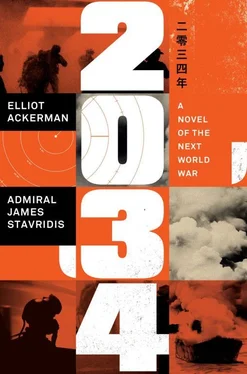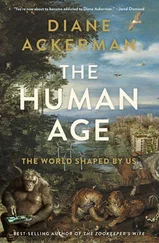If he had once considered himself half American, he no longer thought so. Not after what they’d done at Zhanjiang three days ago. Every member of his crew knew someone who’d perished there, and almost all had family within the blast zone. Countless friends of his—from his academy days, to postings on other ships, to three cousins who had nothing to do with the Navy but who lived in that port city by the turquoise sea—each gone in an instant, in a flash. Others had not been so lucky. Lin Bao couldn’t bear to linger on the details; they were too gruesome. But he knew the hospitals in Beihai, Maoming, Yangjiang, and even as far away as Shenzhen had already filled to capacity.
If the American strike on Zhanjiang had been swift and decisive, the invasion of Taiwan by the People’s Army had proven its equal—though it wasn’t Beijing’s response to the 150-kiloton blast; that was yet to come. A discussion of that response was the reason Lin Bao was summoned away from his ship to a conference, so that he was now awaiting the arrival of Minister Chiang in the airport’s international terminal, in what had once been the British Airways first-class lounge. Floor-to-ceiling windows allowed Lin Bao to marvel at his country’s occupation of the island. Though the invasion had shut down the airport to civilian traffic, it was busy—if not busier—with military traffic, commuter jets having been replaced with fighters and transports, and vacationers and business travelers having been replaced with soldiers. When Minister Chiang at last arrived in the lounge, he was followed by a vast retinue of security, which, as he explained apologetically, was the reason for his delay. “They’ve become very protective of me,” he said, and laughed nervously, offering one of his characteristically expansive smiles to his security detail, none of whom returned it.
Minister Chiang escorted Lin Bao into a conference room, a clean glassed-in cube designed for executives to use between flights. The two sat next to each other at one end of a long table. Lin Bao couldn’t help but notice Minister Chiang’s uniform, which wasn’t his usual service dress but rather a set of poorly fitting camouflage utilities that still held the creases from where they’d been folded in plastic packaging. Like Lin Bao, the minister couldn’t help but steal the occasional admiring glance at his troops as they moved efficiently through the airport, dispersing throughout Taipei and then beyond for the seizure and annexation of this stubborn republic, finally brought to heel.
However, when Minister Chiang’s attention returned to the conference room, his expression turned severe, and he began to knead his chin, as if the action were a way to coax his jaw into motion. Eventually, he spoke, “Our position is becoming increasingly precarious. We have a week, maybe two, until the Americans will have massed their fleets so close to our mainland that we’ll no longer possess free access to the sea. Which is unacceptable. If we allow that to happen, the Americans will strangle us as we have done here, to this island. With our access to the sea blocked, our entire mainland will be under threat of invasion, to say nothing of the nuclear threat. The Americans have crossed that threshold. Once a nation has dropped one nuclear weapon the stigma of a second or a third is less. The moment has come for us to settle on a course of action.”
Minister Chiang was speaking imperiously, which caused Lin Bao to hesitate before replying, “Is that the reason for this”—and Lin Bao struggled for a word to describe the nature of their meeting, which was ostensibly why Minister Chiang had summoned him here, away from his ship, to the British Airways lounge, which increasingly felt like a strange, even illicit location—“I mean, the reason for this conference ?”
Minister Chiang leaned forward in his chair, placing his hand affectionately on Lin Bao’s forearm. Then he glanced out the window, to his security detail, as if making sure his dark-suited entourage observed the gesture. And Lin Bao saw that they did. Gradually, he began to intuit the subtext for their meeting as Minister Chiang confessed that their “conference” was a “conference of two.” Yes, he could have invited the commander of the special forces task force, an unimaginative major general whose troops had already fanned out across Taipei, seizing strategic targets such as radio, television, and power stations, as well as gathering up probable agitators; and he could have also invited the commander of their air forces, a technocrat who was coordinating a vast logistical web of resupply while keeping his fighter and attack aircraft poised for any counterstrike; but to invite either of them would have disrupted their efforts. Also, Minister Chiang explained that he wasn’t certain they possessed “the required competencies for what would come next.”
Which begged the question of what that next would be.
When Lin Bao asked, Minister Chiang grew uncharacteristically reticent. He crossed his arms over his chest, turned his chin slightly to the side, so that he was observing Lin Bao from the corners of his eyes as if to confirm that he had appraised him correctly from the start.
“It seems I’ve been recalled to Beijing,” said Minister Chiang. He once again glanced outside the glass conference room, to where his security detail lingered. Lin Bao now understood; those men were to ensure the minister returned—whether he wanted to or not. “After what happened three days ago in Zhanjiang,” the minister continued, “certain voices are saying that our planning miscalculated the American response.” He fixed his stare on Lin Bao, examining him for the slightest reaction to such charges of miscalculation . “Those same voices, both inside and outside the Politburo Standing Committee, are blaming me. Intrigue like this is nothing surprising. My enemies see a vulnerability and they strike after it. They claim I’m to blame for the actions of our unreliable allies in the Barents Sea, or for an American president whose greatest weakness is her fear of being perceived as weak. I haven’t come as far as I have without possessing certain instincts that allow me to navigate such intrigues. And it is those instincts that drew me to you, Admiral Lin Bao. It is why I made you Ma Qiang’s replacement, and it is why I am asking for your support now, against not only our enemies on the outside but also our enemies within.”
“My support?” asked Lin Bao.
“Yes, for what comes next.”
But Lin Bao still didn’t know what came next. Perhaps they could hold their gains around Taipei and negotiate with the Americans. The devastation of Zhanjiang would be the price they’d pay to annex Taiwan. He said as much to Minister Chiang, reminding him that their original plan was based on a strategy of de-escalation, as well as Sun Tzu’s wisdom about subduing one’s enemy without fighting .
One of the dark-suited security men knocked on the glass with the knuckle of his middle finger. He pointed to his watch. It was time.
Minister Chiang stood, tugging down on his uniform, which had ridden up his soft belly. With all the dignity he could muster, he raised a finger to the impatient member of his security detail, insisting that he wait another moment. Then he turned to Lin Bao and rested his hand on his shoulder. “Yes, we all know that old bit of Sun Tzu. He was a master of asymmetric warfare, of defeating an enemy without giving battle. But he also tells us, On difficult ground, press on; on encircled ground, devise stratagems— ”
The security man swung open the door, interrupting them.
Minister Chiang’s eyes flashed in that direction, but then he fixed them determinedly on Lin Bao. “And on death ground, fight.”
Читать дальше












